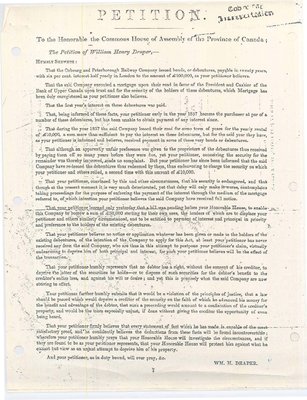The Petition of William Henry Draper,–
HUMBLY SHEWETH:
That the Cobourg and Peterborough Railway Company issued bonds, or debentures, payable in twenty years, with six per cent. interest half yearly in London to the amount of £100,000, as your petitioner believes.
That the said Company executed a mortgage up on their road in favor of the President and Cashier of the Bank of Upper Canada upon trust and for the security of the holders of these debentures, which Mortgage has been duly enregistered as your petitioner also believes.
That the first year’s interest on these debentures was paid.
That, being informed of these facts, your petitioner early in the year 1857 became the purchaser at par of a number of these debentures, but has been unable to obtain payment of any interest since.
That during the year 1857 the said Company leased their road for some term of years for the yearly rental of £10,000, a sum more than sufficient to pay the interest on these debentures, but for the said year they have, as your petitioner is informed and believes, received payment in some of these very bonds or debentures.
That although an apparently unfair preference was given to the proprietors of the debentures thus received by paying them off so many years before they were due, yet your petitioner, conceiving the security for the remainder was thereby improved, made no complaint. But your petitioner has since been informed that the said Company have re-issued the debentures thus redeemed by them, thus endeavoring to charge the security on which your petitioner and others relied, a second time with this amount of £10,000.
That your petitioner, convinced by this and other circumstances, that his security is endangered, and that though at the present moment it is very much deteriorated, yet that delay will only make it worse, contemplates taking proceedings for the purpose of enforcing the payment of the interest through the medium of the mortgage referred to, of which intention your petitioner believes the said Company have received full notice.
That your petitioner learned only yesterday that a bill was pending before your Honorable House, to enable this Company to borrow a sum of £50,000 sterling for their own uses, the lenders of which are to displace your petitioner and others similarly circumstanced, and to be entitled to payment of interest and principal in priority and preference to the holders of the existing debentures.
That your petitioner believed no notice or application whatever has been given or made to the holders of the existing debentures, of the intention of the Company to apply for this Act, at least your petitioner has never received any from the said Company, who are thus in this attempt to postpone your petitioner’s claim, virtually endeavoring to deprive him of both principal and interest, for such your petitioner believes will be the effect of the transaction.
That your petitioner humbly represents that no debtor has a right, without the consent of his creditor, to deprive the latter of the securities he holds—or to dispose of such securities for the debtor’s benefit to the creditor’s entire loss, and against his will or desire; and yet this is precisely what the said Company are now striving to effect.
Your petitioner further humbly submits that it would be a violation of the principles of justice, that a law should be passed which would deprive the creditor of the security on the faith of which he advanced his money for the benefit and advantage of the debtor, that such a proceeding would amount to a confiscation of the creditor’s property, and would be the more especially unjust, if done without giving the creditor the opportunity of even being heard.
That your petitioner firmly believes that every statement of fact which he has made is capable of the most satisfactory proof, and he confidently believes the deductions from these facts will be found incontrovertible; wherefore your petitioner humbly prays that your Honorable House will investigate he circumstances, and if they are found to be as your petitioner represents, that your Honorable House will protect him against what he cannot but view as an unjust attempt to deprive him of his property.
And your petitioner, as in duty bound, will ever pray, &c.
WM. H. DRAPER


